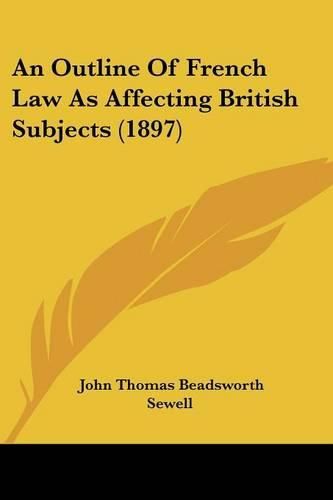Readings Newsletter
Become a Readings Member to make your shopping experience even easier.
Sign in or sign up for free!
You’re not far away from qualifying for FREE standard shipping within Australia
You’ve qualified for FREE standard shipping within Australia
The cart is loading…






Purchase of this book includes free trial access to www.million-books.com where you can read more than a million books for free. This is an OCR edition with typos. Excerpt from book:, AN OUTLINE OF FRENCH LAW AS AFFECTING BRITISH SUBJECTS. CHAPTER I. RIGHT TO RESIDE AND POSSESS PROPERTY IN FRANCE. By virtue of the principles of public international law and of the law of nature, there is no doubt, at least since the Code Civil, that all foreigners are entitled to reside in the territory of France, and to receive the protection of its laws for themselves and their families; that is to say, that in theory every foreigner is entitled to his individual liberty, and is free from prosecution or arrest, except in the cases where a French citizen would be liable to the same. Thus a slave becomes free on touching French soil, in like manner as by English law. But this equality in personal freedom is subject to the liability of expulsion, without any cause assigned, as a measure of police (Art. 7 of the Law of 3rd December, 1849), or in the case of vagabonds (Art. 272, Code Pnal), and extradition for crimes. The foreigner is also now bound to make a declaration of residence. (See Note A.) chapter{Section 4In return for this protection, Art. 3 of the Code Civil provides that Les lois de police et de sret obligent tous ceux qui habitent le territoire. This provision comprises the obligation to suffer expropriation, to pay taxes, but not to serve in the army or navy, which is considered rather as a political right, and so appertaining solely to Frenchmen. Examples of other political rights from which the foreigner is likewise excluded by various enactments are?Being an elector, or eligible for the legislative chambers and municipal and departmental councils, a judge, juryman, member of the council of prud'hommes, holder of an ecclesiastical office, a notary, greffier (registrar), huissier (process server), advocate, or auctioneer (commis-…
$9.00 standard shipping within Australia
FREE standard shipping within Australia for orders over $100.00
Express & International shipping calculated at checkout
Purchase of this book includes free trial access to www.million-books.com where you can read more than a million books for free. This is an OCR edition with typos. Excerpt from book:, AN OUTLINE OF FRENCH LAW AS AFFECTING BRITISH SUBJECTS. CHAPTER I. RIGHT TO RESIDE AND POSSESS PROPERTY IN FRANCE. By virtue of the principles of public international law and of the law of nature, there is no doubt, at least since the Code Civil, that all foreigners are entitled to reside in the territory of France, and to receive the protection of its laws for themselves and their families; that is to say, that in theory every foreigner is entitled to his individual liberty, and is free from prosecution or arrest, except in the cases where a French citizen would be liable to the same. Thus a slave becomes free on touching French soil, in like manner as by English law. But this equality in personal freedom is subject to the liability of expulsion, without any cause assigned, as a measure of police (Art. 7 of the Law of 3rd December, 1849), or in the case of vagabonds (Art. 272, Code Pnal), and extradition for crimes. The foreigner is also now bound to make a declaration of residence. (See Note A.) chapter{Section 4In return for this protection, Art. 3 of the Code Civil provides that Les lois de police et de sret obligent tous ceux qui habitent le territoire. This provision comprises the obligation to suffer expropriation, to pay taxes, but not to serve in the army or navy, which is considered rather as a political right, and so appertaining solely to Frenchmen. Examples of other political rights from which the foreigner is likewise excluded by various enactments are?Being an elector, or eligible for the legislative chambers and municipal and departmental councils, a judge, juryman, member of the council of prud'hommes, holder of an ecclesiastical office, a notary, greffier (registrar), huissier (process server), advocate, or auctioneer (commis-…